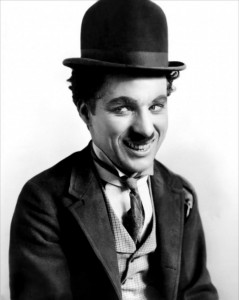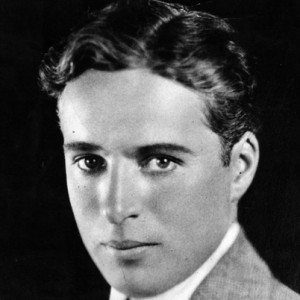Charlie Chaplin will always be remembered as one of the most influential men in entertainment, and specially, comedy. He was a multi-talented entertainer who helped pave the way for modern films and the genre of the comedy as a whole. His films and works are still viewed and referenced today, and his influence is obvious. Yet, even with his prominence and success, many do not realize who the real Charlie Chaplin is. That is because for most of his career he portrayed the same character.
“The Tramp” as it came to be known was the classic Chaplin character that we see in his works. The small mustache, the baggy pants, the cane, the bowler hat, all helped form the overall lovable, clumsy character. This character was used in many of his works, and is how Chaplin is best remembered and thought of today. But Chaplin did not always portray the Tramp. Often times he’d play other characters that did not resemble the Tramp. This sometimes confused audiences because they were so used to seeing the lovable character they all could relate to so well.
What do y’all think about the idea of typecasting? We seem to see it quite frequently and it can make or break an actor. In some cases, an actor can become consumed with a role, and have to apply it to their daily life. Think of Daniel Whitney, better known as Larry the Cable Guy. Whitney has allowed the Larry the Cable Guy role to transform his life, and has prevented him from other works. Think of Pee Wee Herman, or Sasha Baron Cohen and how they become fully emerged in their characters. Do you think this commitment is a beneficial career choice? Do you think it results to continual laughs, or can a repeated, type cast character get old? It is definitely an interesting concept to consider. Let me know what y’all think.



6 Comments
Typecasting is a very sensitive topic. Many actors are typecasted and are very successful, but other times it just gets old. Charlie Chaplin was a good example of typecasting. He was very successful and everyone loved his “the tramp” character. This makes me think of Saturday Night Live. Kristin Wig is one of my favorite actors that has been on this show and plays many different characters. It’s fun to see her play new roles, but whenever she goes back to a role she has done before, I get so excited. This is similar to typecasting in that she is playing the same role over and over again. I have nothing against typecasting as long as it is still seen as humorous and not overdone.
Typecasting is very interesting. It can do wonders for some actors and be detrimental to the careers of others. Charlie Chaplin was successful in his “Tramp” character at the time, but I’m not sure how well it would do today. When I think of some examples of typecasting I think of Patrick Stewart as Professor X in the X-Men series or even Steve Carell. If I were to see Stewart in another movie, I’d be thinking, “Wait, is this an x-men movie?” So for Stewart, I think typecasting has not been detrimental per say, rather limiting. For Carell, early on his career, he continuously played the dumb or immature adult like in 40 year Old Virgin, The Office series, or even Anchorman. Now he has broken his typecast and is moving on to more mature movies.
There is a specific type of typecasting that is old and done and then there is a type where it js successful. Thinking of movies like typical chick flicks there are many actresses that are always seen as the girl next door with no real common sense and the need to find love and get married. Those women are almost degraded in order to create this character that people want to root for. While many actresses are okay with this, there are many more that constantly try to fight that role. The other type is with character actors like Larry the Cable Guy and Sasha Baron Cohen. They are able to become their character and really make it as if they are a real person. This only works in certain situations though and even then a lot of people do not like those character actors. It is very difficult to say whether it is a good or a bad thing but I think it all depends on what the actor wants to do! If I do not want to watch a movie that stars a certain actor or actress I do not have to!
I do believe that typecasting in the entertainment business can make or break someones career. Although there are many actors and actresses who are very versatile with their roles. I’m a huge fan of Meryl Streep, one reason begin that she is able to play a variety of different roles. In todays society we see a lot of people, especially in “romantic comedies” who tend to play the same characters will the same relationship problems. I do think that viewers play a huge part in typecasting actors. When you’ve seen a person play a part for so long it’s hard to watch them portray a different character. But I do think that’s what sets apart a talented actor from just mediocre ones. I don’t see this as beneficial, only because this will limit your choices of movie/TV roles.
I think some actors never escape from the clutches of typecasting. The career of acting is difficult, so some actors and actresses accept the roles they can get and succeed there. In comparison, I think the greatest actors are able to escape this. The obvious example of an actor who has made a complete transformation, across the spectrum, from “serious” roles to comedy is John C. Reilly. For those of you who are terrible with actors’ names (like me), he is in “Talladega NIghts: The Ballad of Ricky Bobby” and “Step Brothers”, with Will Ferrell. John C. Reilly was also in “Gangs of New York”, “The Thin Red Line”, “The Perfect Storm”, “The Aviator”, and plenty of other more serious movies. No one ever saw him as capable of playing comedy roles. Now he is recognized for his hilarious successes. I mentioned before John C. Reilly’s co-starring in several movies with Will Ferrell. I love Will Ferrell, but he is a comic only. He nearly always ends up in his tight-whities and never plays any serious roles. Perhaps it is easier to move from serious to comedy, since audiences might just laugh at someone like Will Ferrell if he tries to be serious. The same might have been for Chaplin. If someone were to make a successful transition from being a comedy star to a successful, more serious-role actor, I would be very impressed.
It’s funny that you bring up typecasting as I was just talking with my friend and his father the other day about the show “Game of Thrones”, and one of the main character King Joffrey played by Jack Gleeson. I won’t say what happens but if Jack Gleeson were to ever try to find a new role in the acting business I believe it will be almost impossible for people to ever like him as an actor because they hated him as a character in the show Game of Thrones. To me if someone’s imagine defines a series or movie, (example Daniel Radcliffe and Harry Potter or Eli and Lord of the Rings) then we can no longer not see them as that person, but it’s interesting to see if actors can break that character to go on and continue acting in other roles. Charlie does a fine job of it, but we can’t help to recall the image of him and his “Tramp” form, just as I won’t be able to see Daniel Radcliffe as Robin in the new Batman movie without thinking about him being Harry Potter. It’s a great way to create an image for yourself, but you don’t want to get stuck in that image as actors such as Will Ferrel, or Micheal Myers have been stuck in.